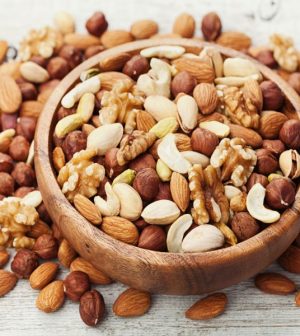- Could Your Grocery Store Meat Be Causing Recurring UTIs?
- Are You Making This Expensive Thermostat Error This Winter?
- Recognizing the Signs of Hypothyroidism
- 10 Strategies to Overcome Insomnia
- Could Artificial Sweeteners Be Aging the Brain Faster?
- Techniques for Soothing Your Nervous System
- Does the Water in Your House Smell Funny? Here’s Why
- Can a Daily Dose of Apple Cider Vinegar Actually Aid Weight Loss?
- 6 Health Beverages That Can Actually Spike Your Blood Sugar
- Treatment Options for Social Anxiety Disorder
How to Create a Diet That Lowers Your Cholesterol

Watching your cholesterol intake has gotten easier.
Nutrition experts now agree that certain foods high in cholesterol, like shrimp and eggs, don’t have the impact on your blood cholesterol that was once thought. Even better, some foods can help lower your blood cholesterol level.
Walnuts have healthy unsaturated fats that help lower LDL — that’s the unhealthy type of cholesterol. Almonds, hazelnuts and pistachios are good choices, too.
Beans and oats have a magic bullet — soluble fiber, which helps flush cholesterol out of your system before it can do harm and also helps with digestive health. Enjoy hot or cold oat cereals and experiment with beans in place of meat.
Avocados are rich in mono-unsaturated fatty acids and can help lower LDL. Mash a few tablespoons to spread on sandwiches instead of mayo and dip raw veggies rather than chips in fresh guacamole.
Plant-based foods, in general, naturally contain sterols and stanols, substances that fight off cholesterol, another reason to boost your intake. Top sources include wheat germ and wheat bran, peanuts, almonds, sesame and olive oils, and Brussels sprouts. Studies have found that getting 2 to 3 grams a day can lower LDL up to 14%.
Your overall diet plan can help lower cholesterol, too. Options include the DASH diet (Dietary Approaches to Stop Hypertension), also designed to lower blood pressure, and the Therapeutic Lifestyle Changes diet, which limits fat intake to no more than 35% of daily calories. It also encourages eating more fruit, vegetables and fish rich in omega-3 fatty acids.
Remember that foods high in saturated fat — such as processed red meats, butter and cream — raise blood cholesterol levels. Limit them in your daily diet.
More information
The U.S. National Heart, Lung, and Blood Institute has more on lowering cholesterol with the Therapeutic Lifestyle Changes diet.
Source: HealthDay
Copyright © 2026 HealthDay. All rights reserved.










